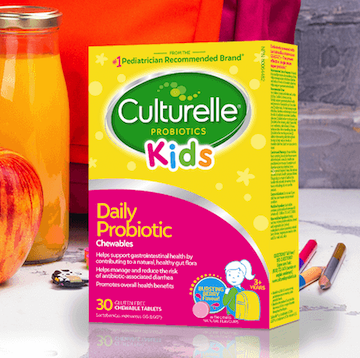Stress and Occasional Digestive Upset in Kids: Causes and Solutions
The information provided herein is for educational purposes only and is not intended to be construed as medical advice or to replace professional medical care. You should always seek the advice of a medical professional before starting any new medication or dietary supplement. The opinions stated herein are those solely of the writer and do not portray the opinions of the Culturelle® brand, i-Health, Inc., or DSM.
Pediatrician and children’s health expert Dr. Jen Trachtenberg° shares her insight on how to spot the signs of stress your child may be exhibiting and tips for managing and alleviating it.
Signs of Stress
You may not know this, but kids do experience stress. Children handle stress in different ways, depending on their age, development and their ever-changing mood. A tired child may react differently than a well-rested one, for example. And some children are just more sensitive to stress in general. Kids who have a strong sense of self-esteem and confidence are more likely to cope better with not only small stressors, like homework or a new babysitter, but big ones like peer pressure, a new school or a new baby in the home. Reactions to stress can be emotional/behavioral such as crying, tantrums, withdrawal or increased attachment to a parent. But common physical symptoms can also occur, such as headaches, difficulty sleeping, occasional digestive upset and changes in appetite.
Children’s Stress Relief Tips and Tricks
In general, kids do best when they know the routines and what to expect, and having clear, consistent rules and boundaries can keep kids on track. It may be helpful to ease into the new school routine a few weeks before the first day. Because sleep is so important to kids’ health, immunity and concentration, make a nighttime routine a priority. Turn off electronics an hour before bedtime, and try some quiet bonding time reading together. Exercise is also important in helping to de-stress kids. This may sound funny, but make sure to schedule unstructured free time to play—let your child run around and explore nature. It may offer more calming benefits than competitive team sports.
Managing Physical Symptoms of Stress in Children
Even with the best of planning and support as a parent, your child may have stressful days resulting in headaches and occasional digestive upset. It’s important to acknowledge that the symptoms are real. When a headache occurs, applying an ice pack and resting in a quiet dark room can help alleviate the pain. Probably the most common symptom related to school stress that I see is tummy troubles—anything from stomach pain to occasional diarrhea. Avoiding specific foods that aggravate the digestive tract including spicy, acidic or greasy foods and drinking plenty of water may help. Have your child take a warm bath or use a heating pad to help relax, calm and decrease tension. Slow, deep breathing exercises are helpful too. I often recommend a kids' probiotic like Culturelle® Kids Daily Probiotic Packets and Chewables as it contains 100% Lactobacillus rhamnosus GG (LGG®) – a probiotic strain that has been clinically shown to help balance the GI tract in kids. It can be taken daily to keep their digestive system running smoothly and to support good health, or as needed to help manage occasional digestive upset.
Remember, some stress in life is normal, even healthy. As a parent, it’s important to listen to your child’s fears and concerns. Give them lots of love and encouragement, and praise their efforts and strengths. Sometimes kids just need a reminder that you are there for them during the ups and downs of growing up.



